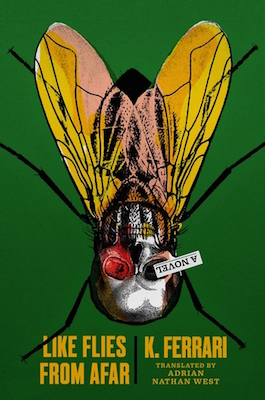
Their Good-Cop, Bad-Cop routine is so grotesque, it seems like a put-on. But Mr. Machi’s nerves make him feel like like he’s no longer himself, but someone else, someone he doesn’t even know.
The one playing good cop looks a little thinner. But he’s not.
“A person like you,” he says, “has got no reason to be in this part of town.”
“Could be dangerous,” he says.
“We’re here to look out for you,” he says.
The other—shorter, fat, mustachioed—is the archetypical Buenos Aires flatfoot. He doesn’t move the pistol from his hip or his finger from the trigger.
“What you doing around here?” he asks. “You lost or something?”
“Or you out trying to find something?” he asks. “You got your license and registration?” he asks.
Mr. Machi perspires through the Armani shirt stained with blood beneath his blazer and digs around for his billfold.
“I felt better when I saw you guys,” he says, “I don’t know this area.
“I was looking to buy a pig,” he says.
“I got lost,” he says. “Here are my license and registration,” he says.
Mr. Machi’s pulse is going like a blender. He gives the bad cop the billfold with his license, his registration, the papers for the Glock, and his concealed carry permit. Also the card of a judge he’s friendly with and another from the minister of the interior.
Please assist the bearer of this card, Señor Luis Machi, with all means at your disposal, the card reads. But the bad cop doesn’t look at it. Instead, he’s eyeing up the papers for the Glock.
“Lookee here,” he says to his partner, “he’s got a gun, too.”
And to Mr. Machi: “Can we see it?”
“Of course,” Mr. Machi says, cowed. Cowed and uncomfortable in a humiliating role he’s far from accustomed to playing. He asks himself when they’ll get around to the part about the bribe; his fear keeps him from making the first move. How much could that fat fuck possibly make? Mr. Machi wonders. Cash, that’ll solve everything.
“Well, a person like yourself has to take certain precautions, there are a lot of delinquents on the loose,” the good cop remarks with a smile straight from a toothpaste ad.
“Exit the vehicle,” the bad cop orders. If his face was in an ad, it would be for antacids. Before and after. The bad cop would be before.
“I don’t think that’s necessary, Sánchez,” the good cop says, but the bad one keeps pressing it, even when Mr. Machi is already halfway out of the car:
“Exit the vehicle, please, and let me see your weapon.”
They look at the Glock, weigh it in their hands, admire its workmanship.
“Nice piece,” the good one sighs. “Congratulations.” “Not like this garbage we’re packing,” Sánchez says,
letting the bad-cop role drop a bit while he palms the holster hanging from his belt, smiles for the first time, and winks. “Just think, we’re law enforcement professionals, and we’ll never get our hands on one of these, will we, Sosa?”
“True,” the good cop, aka Sosa, concedes. “Would you believe, sir, we have to pay for our practice rounds out of our own pocket?”
Mr. Machi doesn’t listen to them, he replies on auto- pilot, lets his years of miscellaneous bribes and kick- backs speak for him while he thinks: I’m calling too much attention to myself here. These two are witnesses, that’s a big risk, I gotta clear out and dump this body somewhere else.
“That’s a damn shame,” he says.
Mr. Machi’s autopilot says it’s a damn shame—that he’d like to do what he can to help out with that regrettable situation, what do people expect if not even the forces of order can make a fair day’s pay—but then Sánchez cuts him off and brings him back to reality.
“You’re missing a bullet here,” he says. “It’s been fired recently.” He’s arching his eyebrows, letting the bad cop peep back through.
“The gentleman has a license,” Sosa butts in, a good cop through and through. “He doesn’t have to explain anything.”
“A couple of dogs,” Mr. Machi claims, not especially sure why.
“I just scared ’em off,” he says.
“I don’t know where exactly, over there, I think, on the other side of the highway,” he ventures.
Sosa smiles. Sánchez smiles.
Mr. Machi realizes that it’s time. He stops trembling, recovers his composure, and smiles in turn.
“Well now, officers,” he says.
And this is why, when he finally puts the BMW in gear—though his wallet is notably lighter, missing several hundred-peso bills, and his Glock is now tucked into Officer Sánchez’s belt next to his subpar regulation pistol—Mr. Machi feels like himself again. The two officers wave him off with copious apologies and offers of assistance with whatever he might need, but Mr. Machi, once more master of himself and a master to others, no longer hears them, and pulls off at top speed.
“I need to get this over with now,” he says, looking himself in the eyes in his rearview mirror.
But it’s not going to be that easy.
__________________________________


